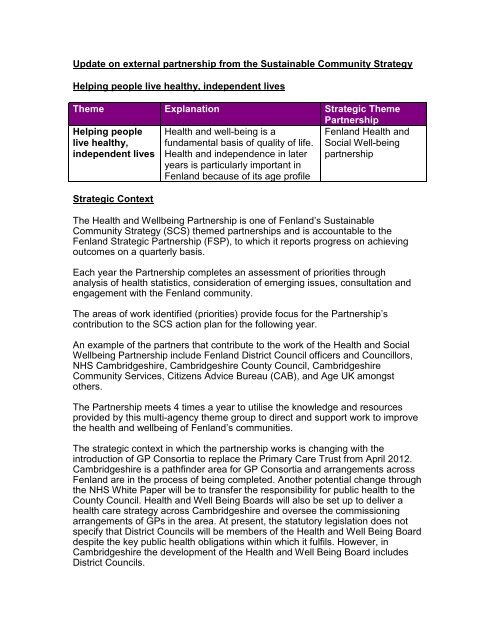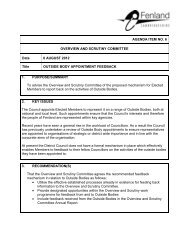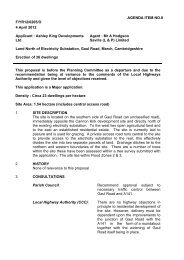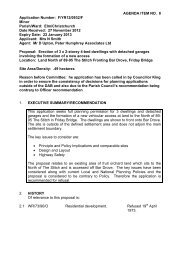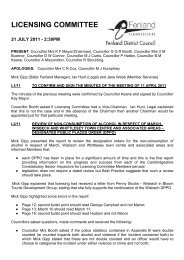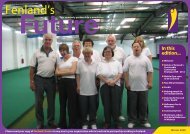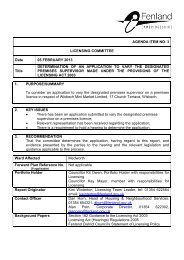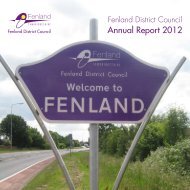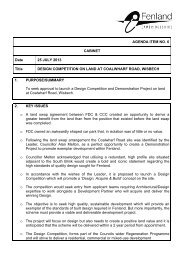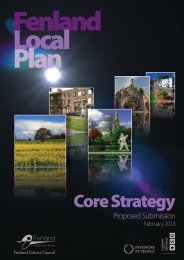(Attachment: 3)Report - 8 pages (45K/bytes) - Fenland District Council
(Attachment: 3)Report - 8 pages (45K/bytes) - Fenland District Council
(Attachment: 3)Report - 8 pages (45K/bytes) - Fenland District Council
Create successful ePaper yourself
Turn your PDF publications into a flip-book with our unique Google optimized e-Paper software.
Update on external partnership from the Sustainable Community Strategy<br />
Helping people live healthy, independent lives<br />
Theme Explanation Strategic Theme<br />
Partnership<br />
Helping people<br />
live healthy,<br />
independent lives<br />
Health and well-being is a<br />
fundamental basis of quality of life.<br />
Health and independence in later<br />
years is particularly important in<br />
<strong>Fenland</strong> because of its age profile<br />
<strong>Fenland</strong> Health and<br />
Social Well-being<br />
partnership<br />
Strategic Context<br />
The Health and Wellbeing Partnership is one of <strong>Fenland</strong>’s Sustainable<br />
Community Strategy (SCS) themed partnerships and is accountable to the<br />
<strong>Fenland</strong> Strategic Partnership (FSP), to which it reports progress on achieving<br />
outcomes on a quarterly basis.<br />
Each year the Partnership completes an assessment of priorities through<br />
analysis of health statistics, consideration of emerging issues, consultation and<br />
engagement with the <strong>Fenland</strong> community.<br />
The areas of work identified (priorities) provide focus for the Partnership’s<br />
contribution to the SCS action plan for the following year.<br />
An example of the partners that contribute to the work of the Health and Social<br />
Wellbeing Partnership include <strong>Fenland</strong> <strong>District</strong> <strong>Council</strong> officers and <strong>Council</strong>lors,<br />
NHS Cambridgeshire, Cambridgeshire County <strong>Council</strong>, Cambridgeshire<br />
Community Services, Citizens Advice Bureau (CAB), and Age UK amongst<br />
others.<br />
The Partnership meets 4 times a year to utilise the knowledge and resources<br />
provided by this multi-agency theme group to direct and support work to improve<br />
the health and wellbeing of <strong>Fenland</strong>’s communities.<br />
The strategic context in which the partnership works is changing with the<br />
introduction of GP Consortia to replace the Primary Care Trust from April 2012.<br />
Cambridgeshire is a pathfinder area for GP Consortia and arrangements across<br />
<strong>Fenland</strong> are in the process of being completed. Another potential change through<br />
the NHS White Paper will be to transfer the responsibility for public health to the<br />
County <strong>Council</strong>. Health and Well Being Boards will also be set up to deliver a<br />
health care strategy across Cambridgeshire and oversee the commissioning<br />
arrangements of GPs in the area. At present, the statutory legislation does not<br />
specify that <strong>District</strong> <strong>Council</strong>s will be members of the Health and Well Being Board<br />
despite the key public health obligations within which it fulfils. However, in<br />
Cambridgeshire the development of the Health and Well Being Board includes<br />
<strong>District</strong> <strong>Council</strong>s.
The purpose of this Partnership is:<br />
• To provide strategic leadership across all agencies in <strong>Fenland</strong> to<br />
coordinate work that addresses health and wellbeing objectives.<br />
• To take responsibility for the delivery of the health and wellbeing projects<br />
identified within the <strong>Fenland</strong> SCS.<br />
• To inform the commissioning of operational work to specialist ‘task and<br />
finish’ groups who are accountable to the health and social being<br />
partnership for successful delivery.<br />
• To influence key strategies and stakeholders through informing them of<br />
health needs in <strong>Fenland</strong> and mainstreaming these needs into the<br />
activities of stakeholder organisations.<br />
• To identify opportunities to bring additional resources to <strong>Fenland</strong> to<br />
support health improvement activities.<br />
• To incorporate views and feedback raised by the community through<br />
channels such as the Community Fairs and Neighbourhood Forums.<br />
• To promote the work of the Partnership to partners, staff and the<br />
community through communication mechanisms.<br />
The Health and Wellbeing Partnership’s (HWB) three priorities are:<br />
1. Providing people with opportunities and encouragement to live a healthy<br />
lifestyle<br />
2. Shaping future health provision in <strong>Fenland</strong> through improving access to<br />
information and services<br />
3. Maintaining independent living<br />
Progress in delivering each priority<br />
Priority 1: Providing people with opportunities and encouragement to live a<br />
healthy lifestyle<br />
Evidence Base:<br />
There is an established evidence base regarding lifestyle choices in <strong>Fenland</strong>. In<br />
particular, the Joint Strategic Needs Assessment for Cambridgeshire (JSNA)<br />
details there are high levels of smoking, obesity, teenage pregnancy and low<br />
levels of exercise and healthy eating in <strong>Fenland</strong> compared to Cambridgeshire,<br />
east of England and national averages.<br />
Smoking:<br />
• Approximately 27% of adults who live in <strong>Fenland</strong> smoke, which is the highest<br />
estimated figure in the County (Cambridgeshire average is 22%), and higher<br />
than the national average of 25.8%.<br />
• Two of the top five wards for estimated smoking prevalence in<br />
Cambridgeshire are in <strong>Fenland</strong> - Waterlees at 40% and Kingsmoor at 36%.
• Smoking is implicated in 4 in every 7 deaths in the over 65s in <strong>Fenland</strong>. There<br />
are benefits from stopping smoking at any age, but they are greater the<br />
earlier cessation takes place.<br />
Obesity and Exercise:<br />
• The JSNA states that <strong>Fenland</strong> has the highest proportion of obese adults at<br />
29%, which is significantly higher than the national average of 22%.<br />
• Of the 123 wards in Cambridgeshire, <strong>Fenland</strong> has the top 18 wards with the<br />
highest estimated prevalence of obese adults.<br />
• The <strong>Fenland</strong> Annual Health <strong>Report</strong> also states that 14% of <strong>Fenland</strong> children<br />
are obese compared to a national figure of 10%.<br />
• The JSNA states that only 21.7% of residents in <strong>Fenland</strong> consume five or<br />
more portions of fruit and vegetables in a day compared to the 23.7% national<br />
average.<br />
• In relation to exercise, the JSNA reports that <strong>Fenland</strong> has the highest level of<br />
zero participation in moderate intensity activity across the county and<br />
compared to other districts in the East and England averages.<br />
Teenage pregnancy:<br />
In Cambridgeshire about 1 in 35 girls aged 15-17 become pregnant each year,<br />
with the highest teenage pregnancy rates in <strong>Fenland</strong> and Cambridge City.<br />
The Children’s JSNA states that the 5 wards in which teenage pregnancy is<br />
highest in the county are in <strong>Fenland</strong>.<br />
Teenage pregnancy rates are declining across Cambridgeshire and <strong>Fenland</strong>,<br />
with the rate at its lowest in <strong>Fenland</strong> for 20 years.<br />
Drug and alcohol abuse:<br />
• On average there are over 4,500 alcohol related hospital admissions a year,<br />
with statistically significantly high rates in <strong>Fenland</strong> and Cambridge City<br />
compared to the Cambridgeshire average.<br />
G<br />
Sub Priority 1.1 Smoking Cessation<br />
Aim: The aim of this project is to promote smoking cessation activities and<br />
reduce the prevalence of smoking in vulnerable groups.<br />
Progress: The three individual projects outlined below have targeted sections of<br />
the community where smoking is at its highest. All three projects have been<br />
aided through the appointment of a dedicated Smoking Cessation Advisor<br />
working with community groups in the Waterlees area. A weekly clinic is held at<br />
the Oasis Centre which has recently been extended as the clinics are generally<br />
full each week.
Access to smoking cessation services is important, therefore, staff from across<br />
partner organisations have undergone training to be able to promote and refer<br />
members of the public to the service. This includes 30 Children’s Centre staff,<br />
and FDC staff from the Leisure Centres, and Housing Options team.<br />
This sub-priority involves three specific projects:<br />
1.1.1 To reduce smoking within the Family Nurse Partnership (FNP)<br />
caseload of teenage parents in Wisbech<br />
Family nurses in Wisbech have been trained by CamQuit to enable them to<br />
effectively educate and refer teenage parents who are smokers to smoking<br />
cessation services. Increased promotion of the project is planned and Health<br />
Trainers have offered to help with this project. The target for this project is to<br />
reduce the number of teenage mothers who smoke by 50%.<br />
1.1.2 To reduce smoking prevalence in homeless families<br />
Members of the <strong>Fenland</strong> <strong>District</strong> <strong>Council</strong> Housing Options team have been<br />
trained by CamQuit to enable them to effectively refer residents who present<br />
themselves as homeless to smoking cessation services. Marketing materials for<br />
the scheme have been produced which are displayed in community locations and<br />
contact with other partners who may come into contact with homeless people<br />
with a smoking habit is being explored.<br />
1.1.3 To promote Smoking Cessation in local businesses<br />
A new Tobacco Control Co-ordinator is leading work on this project. Members of<br />
the <strong>Fenland</strong> <strong>District</strong> <strong>Council</strong> Environmental Health team have been trained by<br />
CamQuit to enable them to effectively refer residents to smoking cessation<br />
services. Proactive introduction calls to sign up and engage local businesses<br />
have been conducted and marketing and promotional materials have been<br />
produced and information sessions held.<br />
G<br />
Sub Priority 1.2 Obesity levels in children and young people<br />
Aim: The aim of this project is to reduce the number of year 6 children who are<br />
obese.<br />
Progress: Only 1 school out of those 10 written to in October 2010 returned an<br />
expression of interest in the SmallSteps4Life programme. In light of lack of<br />
partnership staff resource to support wide project implementation the decision<br />
was made to proceed and pilot within 1 school. This will also help to steer the<br />
type and level of support that may be required to roll out the project. The project<br />
is being taken forward with Elm Primary School in partnership with the Healthy<br />
Schools Programme. Support is being provided to ensure that the project is fully<br />
evaluated by NHS Cambridgeshire.
G<br />
Sub Priority 1.3 Obesity levels in adults<br />
Aim: The aim of this project is to reduce the number of adults who are<br />
overweight and obese and reduce the number of deaths arising from obesity.<br />
Progress: A package of projects has been designed to reduce obesity levels in<br />
adults. This package includes use of the Mobile Gym and Support Vehicle, GP<br />
Referral project and use of British Heart Foundation (BHF) funded lifestyle coach.<br />
The Mobile Gym team has been touring the district and is deployed 4 days per<br />
week encouraging people to use the gym to improve health and exercise rates.<br />
The Mobile Gym Support Vehicle has been undertaking health assessments with<br />
the public providing healthy lifestyle advice and signposting to health services. To<br />
date 1,680 health assessments have been completed. The Mobile Gym team has<br />
referred 20 high risk clients to GP’s based on lifestyle check results and 3<br />
individuals to Camquit. Many people have been referred to <strong>Council</strong> leisure<br />
centres by their doctor for a tailored programme of exercise to improve health<br />
and well being. There have been 236 exercise referrals to date with a 60%<br />
completion rate.<br />
G<br />
Sub Priority 1.4 Adult participation in regular exercise<br />
Aim: To reduce adult obesity, increase participation in regular exercise and<br />
increase life expectancy.<br />
Progress: A BHF Lifestyle Coach has been deployed providing specialist<br />
exercise classes for members of the community recovering from cardiovascular<br />
treatment. The Health @ Work scheme trial has been initiated with a large<br />
employer of Eastern European people. Capital improvement of the leisure<br />
centres is underway to increase the capacity and attractiveness of exercise to the<br />
community. Research for a Traveller specific Healthy Lifestyle DVD is underway<br />
with the travelling community. The Mobile Gym has recently amended its<br />
timetable in line with customer feedback/business case to maximise usage. 55<br />
Mobile Gym users have been encouraged to transfer to a leisure centre, and the<br />
total number of visits to the gym is 1,830 and the gym has 331 members<br />
registered.<br />
G<br />
Sub Priority 1.5 Sexual health and teenage pregnancy<br />
Aim: To reduce teenage pregnancy rates and sexually transmitted infections<br />
(STIs). To increase the number of young people accessing services.
Progress: Weekly sexual health clinics are held at Thomas Clarkson Community<br />
College in Wisbech and the College of West Anglia (Wisbech campus), Neale<br />
Wade Community College in March and Cromwell Community College in<br />
Chatteris. Student and staff feedback from the colleges so far has been positive,<br />
and increasing numbers of students access the services each week. The project<br />
has ongoing support from the Chlamydia Screening Programme and voluntary<br />
sector groups who assist with screening and C-Card (condom distribution).<br />
A consultant-led clinic service will now be provided at Wisbech (North Cambs)<br />
Hospital from April 2011.<br />
R<br />
Sub Priority 1.6 Drug and alcohol abuse<br />
Aim: To reduce drug and alcohol-related injuries and illness.<br />
Progress: A project scoping document was developed and shared with the<br />
Wisbech Community Alcohol Partnership (CAP) with a view to piloting improved<br />
services integration, in Wisbech initially, with the potential to expand into March<br />
by creating a second CAP. This project has stalled due to staffing issues.<br />
PRIORITY 2: Shaping future health provision in <strong>Fenland</strong> through improving<br />
access to information and services<br />
Evidence Base: Priority 2<br />
The Joint Strategic Needs Assessment for Cambridgeshire (2008)<br />
Access to services:<br />
• Although a high proportion of the population have access to some type of<br />
private transport, approximately 20% of households do not have any access<br />
to a private vehicle, and so are reliant on the provision of public transport.<br />
• Four in ten pensioners do not have access to a car or van.<br />
• For those residents living in the more remote villages, public transport is an<br />
issue, with poor availability of services and a very limited number of bus<br />
routes.<br />
G<br />
Sub Priority 2.1 Access to services<br />
Aim: To improve access to services and information.<br />
Progress: Analysis of current access routes to hospitals and GP surgeries via<br />
public transport have been mapped to provide an evidence base for discussion<br />
with service and transport providers to improve access to health services in the<br />
four <strong>Fenland</strong> market towns. This analysis had shown that many people, in
particular those in receipt of free bus passes, are not within 400 metres of a bus<br />
stop. Furthermore, current bus routes do not travel to key health service<br />
locations. Through the use of this evidence the Health and Social Wellbeing<br />
partnership and <strong>Fenland</strong> <strong>District</strong> <strong>Council</strong> were invited to assist Cambridgeshire<br />
County <strong>Council</strong>’s Health and Adult Social Care Scrutiny Committee regarding<br />
Doddington Hospital and wider transport issues. This has now inspired partners<br />
to work proactively together to solve these issues. Targeted marketing has been<br />
undertaken using the map based evidence to ensure local residents who do not<br />
live within 400 metres of a bus service are aware of the community transport<br />
services available.<br />
G<br />
Sub Priority 2.2 Transport links to healthcare<br />
Aim: More efficient use of existing bus and community transport services to<br />
improve access to healthcare.<br />
Progress: Complimenting work the project set out at 2.1, further work has been<br />
undertaken in relation to access to healthcare. This has been completed by<br />
gathering data regarding travel arrangements to GP and hospital visits. A<br />
questionnaire will be placed in all <strong>Fenland</strong> surgeries and hospitals to obtain<br />
patient feedback on methods of travel to healthcare appointments. This evidence<br />
will assist with future planning for healthcare and transport. The questionnaire is<br />
now complete and will be made available for the public to complete in GP<br />
Surgeries and hospitals in <strong>Fenland</strong> from April – July 2011. CCC, NHS and FDC<br />
now include the full range of co-ordinated transport information for <strong>Fenland</strong> on<br />
their websites. The information from the questionnaire will help to inform the<br />
future dial a ride pilot project for Doddington Hospital and will assist the new GP<br />
Clusters with transport decision making. During March 2011 NHS<br />
Cambridgeshire will be making new criteria available to GP surgeries for<br />
assessing whether patients are eligible for patient transport.<br />
PRIORITY 3: Maintaining independent living<br />
Evidence Base: Priority 3<br />
The Joint Strategic Needs Assessment for Cambridgeshire (2008)<br />
Keeping Active:<br />
• 19% of <strong>Fenland</strong>’s population is over the age of 65 and 9% over 75.<br />
• <strong>Fenland</strong> has a higher proportion of ‘all pensioner’ households (13%) than the<br />
national average (9%). <strong>Fenland</strong> also has the highest proportion of one-person<br />
pensioner households in Cambridgeshire as over 15% of households consist<br />
of one pensioner living alone.<br />
• Frailty in older people will place more demands for care at home. Currently<br />
there are estimated to be 13,900 elderly people in Cambridgeshire who are
physically or mentally frail or both. Between 2006 and 2011, numbers of<br />
elderly frail people are predicted to rise from 2,650 to 2,930 in <strong>Fenland</strong>.<br />
Winter Warmth:<br />
• There are over 13,000 households in Cambridgeshire in fuel poverty. Five<br />
areas in Cambridge City, two in Huntingdonshire and one in <strong>Fenland</strong> are in<br />
the worst 10% in England.<br />
G<br />
Sub Priority 3.1 Maintain independent living (Keeping Active)<br />
Aim: To increase support for vulnerable residents to enable them to safely<br />
remain in their home and reduce the risk of accidents and falls. To develop &<br />
target physical activity provision for older, frail, long term conditions for those that<br />
are unable to access hospital provision.<br />
Progress: A Falls Prevention class for <strong>Fenland</strong> has been developed and is about<br />
to be launched. Roddons Housing Association have agreed to train all their<br />
sheltered housing staff, who will then run sessions which are also open to the<br />
wider community. Funding from the Stroke Heart Foundation has been received<br />
for an exercise after stroke project. In total 8 members of staff are being trained.<br />
Discussions have commenced with the Clinical Exercise Specialist Falls<br />
Prevention Service CCS regarding the development of a programme of physical<br />
activity for older people. A project plan for this priority is currently in development.<br />
A pilot PSI class has been set up for 12 weeks and will begin at the George<br />
Campbell Leisure Centre in March 2011.<br />
G<br />
Sub Priority 3.2 Maintain independent living (Winter Warmth Project)<br />
Aim: To meet accommodation needs of frail elderly residents by helping them<br />
access home heat resources.<br />
Progress: An information pack “brown bag” was developed for distribution in GP<br />
practices at “flu clinics” and these were distributed to practices and a total of<br />
10,000 were given out at flu clinics. Work is currently being undertaken with the<br />
Home Shield Project (a county-wide project co-ordinated by Age UK and<br />
Cambridgeshire County <strong>Council</strong>) which intends to roll out training to health staff<br />
to help identify vulnerable people in need of services.


